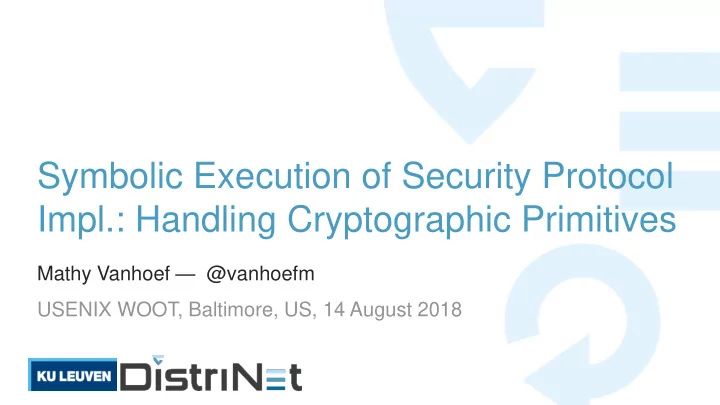

Symbolic Execution of Security Protocol Impl.: Handling Cryptographic Primitives Mathy Vanhoef — @vanhoefm USENIX WOOT, Baltimore, US, 14 August 2018
Overview Symbolic Execution 4-way handshake Handling Crypto Results 2
Overview Symbolic Execution 4-way handshake Handling Crypto Results 3
Symbolic Execution Mark data as symbolic void recv(data, len) { Symbolic branch if (data[0] != 1) return if (data[1] != len) return int num = len/data[2] ... } 4
Symbolic Execution data[0] != 1 data[0] == 1 void recv(data, len) { void recv(data, len) { if (data[0] != 1) if (data[0] != 1) return return if (data[1] != len) if (data[1] != len) return return int num = len/data[2] int num = len/data[2] ... ... } } 5
Symbolic Execution PC = Path data[0] != 1 data[0] == 1 Constraint Continue execution: if (data[1] != len) 6
Symbolic Execution data[0] != 1 data[0] == 1 && data[0] == 1 && data[1] != len data[1] == len Continue execution 7
Symbolic Execution data[0] == 1 && data[1] == len void recv(data, len) { if (data[0] != 1) return if (data[1] != len) return Can data[2] equal zero int num = len/data[2] under the current PC? ... 8
Symbolic Execution data[0] == 1 && data[1] == len void recv(data, len) { if (data[0] != 1) Yes! Bug detected! return if (data[1] != len) return Can data[2] equal zero int num = len/data[2] under the current PC? ... 9
Implementations We build upon KLEE › Works on LLVM bytecode › Actively maintained Practical limitations: › 𝑞𝑏𝑢ℎ𝑡 = 2 |𝑗𝑔−𝑡𝑢𝑏𝑢𝑓𝑛𝑓𝑜𝑢𝑡| › Infinite-length paths › SMT query complexity 10
Overview Symbolic Execution 4-way handshake Handling Crypto Results 11
Motivating Example Mark data as symbolic void recv(data, len) { plain = decrypt(data, len) if (plain == NULL) return if (plain[0] == COMMAND) process_command(plain) else ... } 12
Motivating Example Mark data as symbolic void recv(data, len) { Summarize crypto algo. plain = decrypt(data, len) (time consuming) if (plain == NULL) return Analyze crypto algo. if (plain[0] == COMMAND) (time consuming) process_command(plain) else Won’t reach this code! ... } 13
Efficiently handling decryption? Decrypted output = fresh symbolic variable 14
Example Mark data as symbolic void recv(data, len) { create fresh plain = decrypt(data, len) symbolic variable if (plain == NULL) return if (plain[0] == COMMAND) Normal analysis process_command(plain) else Can now analyze code ... that parses decrypted data } 15
Other Applications Handling hash functions › Output = fresh symbolic variable › Also works for HMACs (Message Authentication Codes) Tracking use of crypto primitives? › Recording relationship between input & output › Treating fresh variable as information flow taint 16
Detecting Crypto Misuse Timing side-channels › ∀(𝑞𝑏𝑢ℎ𝑡) : all bytes of MAC in path constraint? › If not: comparison exits on first difference Decryption oracles › Behavior depends on unauth. decrypted data › Decrypt data is in path constraint, but not in MAC 17
Overview Symbolic Execution 4-way handshake Handling Crypto Results 18
The 4-way handshake Used to connect to any protected Wi-Fi network Negotiates fresh PTK: Mutual authentication pairwise transient key 19
4-way handshake (simplified) 20
4-way handshake (simplified) 21
4-way handshake (simplified) PTK = Combine(shared secret, ANonce, SNonce) 22
4-way handshake (simplified) 23
4-way handshake (simplified) Encrypted with PTK 24
4-way handshake (simplified) 25
4-way handshake (simplified) 26
4-way handshake (simplified) Authenticated with a MAC 27
We focus on the client Symbolic execution of Intel’s iwd deamon wpa_supplicant kernel driver How to get these working under KLEE? 28
Intel’s iwd Avoid running full program under KLEE › Would need to model Wi-Fi stack symbolically Our approach › iwd contains unit test for the 4-way handshake › Reuse initialization code of unit test! › Symbolically execute only receive function 29
wpa_supplicant Unit test uses virtual hardware and runs full AP › Still need to simulate Wi- Fi stack… Alternative approach: › Write unit test that isolates 4-way handshake like iwd › Then symbolically execute receive function! › Need to modify code of wpa_supplicant (non-trivial) 30
MediaTek’s Driver No unit tests & it’s a Linux driver › Symbolically executing the Linux kernel?! Inspired by previous cases › Write unit test & simulate used kernel functions in userspace › Verify extracted code is correctly simulated in userspace! 31
Not all our unit tests are created equally https://github.com/vanhoefm/woot2018 32
Overview Symbolic Execution 4-way handshake Handling Crypto Results 33
Discovered Bugs I Timing side-channels › Authentication tag not checked in constant time › MediaTek and iwd are vulnerable Denial-of-service in iwd › Caused by integer underflow › Leads to huge malloc that fails 34
Discovered Bugs II Buffer overflow in MediaTek kernel driver › Occurs when copying the group key › May lead to remote code execution Flawed AES unwrap crypto primitive › Also in MediaTek’s kernel driver › Manually discovered 35
Decryption oracle in wpa_supplicant Decryption oracle: › Doesn’t check authenticity of malformed handshake message › But does decrypt and process data Decrypt group key (GTK) in Message 3 (Msg3) 36
Decryption oracle in wpa_supplicant II Msg3’: decrypted using RC4, but not authenticated 𝒚 𝟏 … 𝒚 𝟒𝟖 221 header 38 Type Length GTK 𝒚 𝟏 … 𝒚 𝟒𝟔 𝒚 𝟒𝟕 𝒚 𝟒𝟖 header 221 36 GTK’ Type’ Length’ Type Length Parsing only succeeds if 𝑦 37 is zero 37
Future work Short-term › Efficiently simulate reception of multiple packets › If 1 st packet doesn’t affect state, stop exploring this path Long-term › Extract packet formats and state machine › Verify basic properties of protocol 38
Conclusion › Symbolic execution of protocols › Simple simulation of crypto › Interesting future work 39
As a final note… 40
Thank you! Questions?
Recommend
More recommend